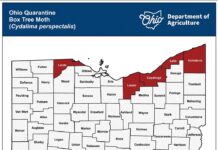SALEM, Ohio – How would you like it if the county commissioners came knocking at your door to say they were selling off your farm or home to build a new Wal-Mart?
Or, if they said most of your neighborhood would be razed and a car dealership would replace the ranches and saltbox homes that had been there for years?
The U.S. Supreme Courtrecently said it was OK for local governments to take homes, small businesses and churches to build something a little more economically beneficial.
But that decision didn’t sit well with many Ohioans.
Legislators jumped on the issue and Aug. 3 introduced legislation that might protect Ohioans from the most recent interpretation of eminent domain.
The concept. The power of eminent domain comes from the Fifth Amendment of the U.S. Constitution: ” … Private property [shall not] be taken for public use without just compensation.”
That power was typically held for projects like highways and sewer lines, things most Americans agreed were for the public good.
But some local governments pushed the definition to include any type of project that might be economically beneficial, not just for the good of the community.
Kelo case. A good example of the ‘new’ eminent domain is in New London, Conn. Susette Kelo’s home and her neighbors’ homes were condemned by the city of New London so developers can build luxury condos, a hotel, and office space.
Kelo’s case went all the way to the U.S. Supreme Court, which said in a 5-4 decision in June, “the city has carefully formulated a development plan that it believes will provide appreciable benefits to the community, including, but not limited to, new jobs and increased tax revenue.”
“Promoting economic development is a traditional and long accepted governmental function, and there is no principled way of distinguishing it from the other public purposes the court has recognized,” wrote Justice John Paul Stevens.
The majority court opinion also said, however, “there is no allegation that any of [the] properties is blighted or otherwise in poor condition; rather, they were condemned only because they happen to be located in the development area.”
Federal response. The decision sent landowners and lawmakers into a tizzy, prompting both the federal House and Senate to take action.
U.S. Rep. James Sensenbrenner Jr. of Wisconsin and U.S. Sen. John Cornyn of Texas penned bills to curb what they’re calling abuse of eminent domain.
Sensenbrenner introduced his bill July 1 and garnered the support of 126 other federal legislators, and Cornyn’s has 25 cosponsors.
Both bills are in committee.
Ohio’s John Boehner was one supporter. “The founding fathers fought a revolution against a government with unlimited authority to seize private property,” Boehner said.
“And yet that’s exactly what the Supreme Court’s handed us: a government that can take what it wants when it wants it. This bill is a step in the right direction in reclaiming property rights for Americans,” he said.
Georgia’s Rep. Phil Gingrey filed a related bill that would affect taxation on property seized by eminent domain.
Swift action. Lawmakers in at least 31 states have also taken swift action.
Last week, Alabama Gov. Bob Riley signed into law legislation that prohibits cities and counties from using eminent domain for private development or for enhancing tax revenue. Alabama is the first state to take action in the wake of the Kelo ruling.
A number of other states have also introduced legislation or went back to the table on previously introduced bills, according to the Institute for Justice.
Other states are working on state constitutional amendments or have formed commissions and task forces to study the concept of eminent domain.
In Ohio. Just last week, the action trickled down to Ohio.
State Sen. Timothy Grendell of Chesterland took his turn on the floor Aug. 3 and introduced a bill
to impose a statewide moratorium on eminent domain.
“Eminent domain is an important tool for local governments to use, but it should not be abused or exploited,” Grendell said in a written release.
The legislation is cosponsored by Sen. Kimberly Zurz.
“Citizens are scared that their property could be wrongly taken from them without any recourse,” Zurz said.
“The definition of blighted property now has a twisted meaning for private developers who can use it for their benefit. It’s not fair or right for private property owners to feel vulnerable because of this court ruling.”
Wait and see. The legislation proposes a hold period until Dec. 31, 2006, which will give the legislature time to review and develop a response to the issue, said Jarrod Bottomley, an assistant to Grendell.
“We feel this is wrong. Eminent domain is supported for public use, but not for private benefit,” Bottomley said.
“The public shouldn’t have to give up their home for a corporation.”
Bottomley said the legislation also calls for a task force to review eminent domain and decide its best course for Ohioans.
(Reporter Andrea Myers welcomes reader feedback by phone at 1-800-837-3419, ext. 22, or by e-mail at amyers@farmanddairy.com.)
Get 4 Weeks of Farm and Dairy Home Delivered










